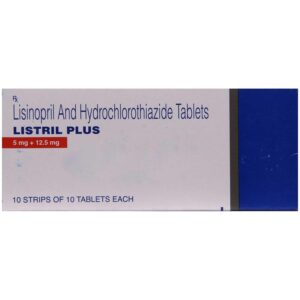LISINOPRIL + HYDROCHLOROTHIAZIDE
Lisinopril: Lisinopril is an angiotensin-converting enzyme (ACE) inhibitor that is commonly prescribed for the treatment of high blood pressure (hypertension), heart failure, and to improve survival after a heart attack. It comes in tablet form and is usually taken once a day.
The primary mechanism of action of lisinopril is to inhibit ACE, an enzyme responsible for converting the hormone angiotensin I into angiotensin II. Angiotensin II is a potent vasoconstrictor (narrows blood vessels) and also stimulates the release of aldosterone, a hormone that promotes salt and water retention, which can raise blood pressure. By inhibiting ACE, lisinopril reduces the production of angiotensin II, leading to vasodilation (widening of blood vessels) and decreased aldosterone secretion, resulting in lower blood pressure.
The usual starting dose of lisinopril for high blood pressure is 10 mg once daily, which can be increased up to 40 mg per day if necessary. The dose may vary depending on the individual’s condition and response to the medication. For heart failure, the starting dose is usually lower, around 2.5-5 mg once daily, and is gradually increased over several weeks.
Some common side effects of lisinopril can include dizziness, headache, cough, fatigue, gastrointestinal disturbances (such as nausea, diarrhea, or abdominal pain), and low blood pressure. Rare but serious side effects include allergic reactions, angioedema (swelling of the face, lips, tongue, or throat), and kidney problems. Lisinopril can also cause an increase in potassium levels, so regular blood tests may be necessary to monitor potassium levels.
It is important to note that lisinopril should not be used during pregnancy as it may harm the developing fetus. It is also contraindicated in patients who have a history of angioedema related to ACE inhibitors, hereditary or idiopathic angioedema, or bilateral renal artery stenosis.
As with any medication, it is crucial to take lisinopril as prescribed and to consult a healthcare professional for any questions or concerns regarding its use or potential side effects.
Hydrochlorothiazide: Hydrochlorothiazide is a medication commonly prescribed for the management of high blood pressure (hypertension) and fluid retention (edema). It belongs to a class of drugs known as thiazide diuretics.
The primary mechanism of action of hydrochlorothiazide is its ability to increase the excretion of water and electrolytes (such as sodium and chloride) by the kidneys. By increasing urine production, it helps to reduce blood volume and decrease fluid accumulation in the body. This, in turn, helps to lower blood pressure and relieve swelling caused by fluid retention.
The usual recommended dose of hydrochlorothiazide for hypertension is 12.5-50mg once daily, while for edema, the daily dose can range from 25-100mg. The dosage may vary depending on the individual’s response to the medication and their specific condition. It is important to follow the prescribed dosage and consult with a healthcare professional for personalized guidance.
Some common side effects of hydrochlorothiazide include frequent urination, dizziness, headache, muscle cramps, weakness, and low blood potassium levels (hypokalemia). Additionally, it may cause blood sugar levels to increase, so individuals with diabetes should monitor their blood glucose closely. In rare cases, severe allergic reactions, skin rash, liver problems, or electrolyte imbalances can occur. It is crucial to promptly report any unusual or severe side effects to a healthcare provider.
Hydrochlorothiazide may interact with other medications, such as lithium, nonsteroidal anti-inflammatory drugs (NSAIDs), and certain blood pressure-lowering drugs. It is important to inform the healthcare provider of all the medications, including over-the-counter drugs and supplements, being taken to avoid potential interactions.
Overall, hydrochlorothiazide is an effective medication in the management of hypertension and edema, but it is essential to use it under the guidance of a healthcare professional and closely monitor for any side effects or complications.

